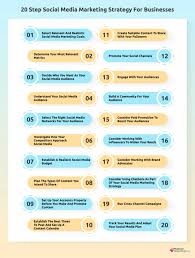The Power of Social Media Marketing
Social media has revolutionised the way businesses connect with their audience. With billions of active users on platforms like Facebook, Instagram, Twitter, and LinkedIn, social media marketing has become an essential tool for reaching and engaging with potential customers.
One of the key benefits of social media marketing is its ability to create a direct and personal connection with your target audience. By sharing engaging content, responding to comments and messages, and running targeted ad campaigns, businesses can build brand loyalty and trust among their followers.
Furthermore, social media provides valuable insights into consumer behaviour and preferences. Through analytics tools offered by platforms like Facebook Ads Manager and Twitter Analytics, businesses can track the performance of their campaigns in real-time and make data-driven decisions to optimise their strategies.
Another advantage of social media marketing is its cost-effectiveness compared to traditional advertising channels. With the ability to reach thousands or even millions of users with a single post or ad campaign, businesses can achieve significant exposure at a fraction of the cost.
However, successful social media marketing requires more than just posting content regularly. It’s essential to have a well-defined strategy that aligns with your business goals and target audience. This includes identifying the most appropriate platforms for your brand, creating engaging content that resonates with your followers, and monitoring performance metrics to measure success.
In conclusion, social media marketing offers businesses a powerful platform to connect with customers, build brand awareness, drive website traffic, and ultimately increase sales. By leveraging the unique features of each platform and staying up-to-date with trends in the ever-evolving landscape of social media, businesses can unlock the full potential of this dynamic marketing channel.
Mastering Social Media Marketing: 6 Essential Tips for Success
- 1. Define your target audience clearly to tailor your content effectively.
- 2. Engage with your followers by responding to comments and messages promptly.
- 3. Use high-quality visuals and videos to make your posts stand out.
- 4. Plan a consistent posting schedule to maintain visibility and engagement.
- 5. Collaborate with influencers or other brands to reach a wider audience.
- 6. Analyse your performance regularly to adjust strategies for better results.
1. Define your target audience clearly to tailor your content effectively.
To maximise the impact of your social media marketing efforts, it is crucial to define your target audience clearly. By understanding the demographics, interests, and behaviours of your audience, you can tailor your content effectively to resonate with them. This approach not only increases engagement and interaction but also helps in building a loyal following that is more likely to convert into customers. Identifying and catering to the specific needs and preferences of your target audience is key to creating meaningful connections and driving successful outcomes in your social media campaigns.
2. Engage with your followers by responding to comments and messages promptly.
Engaging with your followers by responding to comments and messages promptly is a crucial aspect of effective social media marketing. By actively interacting with your audience, you not only show that you value their feedback and opinions but also build a stronger connection with them. Prompt responses demonstrate your commitment to customer service and can help foster trust and loyalty towards your brand. Additionally, engaging with followers can lead to meaningful conversations, increase brand visibility, and ultimately drive more engagement on your social media channels.
3. Use high-quality visuals and videos to make your posts stand out.
In the realm of social media marketing, leveraging high-quality visuals and videos can significantly elevate the impact of your posts. By incorporating visually appealing content, such as striking images and engaging videos, you can capture the attention of your audience and make your brand more memorable. These visual elements not only enhance the aesthetic appeal of your posts but also convey information in a more compelling and shareable way, ultimately helping your content stand out amidst the sea of online distractions.
4. Plan a consistent posting schedule to maintain visibility and engagement.
To maximise visibility and engagement on social media, it is crucial to plan a consistent posting schedule. By establishing a regular cadence of posts, businesses can maintain a strong presence on platforms and keep their audience engaged. Consistency not only helps to build brand recognition but also ensures that followers know when to expect new content, increasing the likelihood of interaction and driving ongoing engagement with the brand.
5. Collaborate with influencers or other brands to reach a wider audience.
Collaborating with influencers or other brands is a strategic tip in social media marketing to expand your reach and engage with a broader audience. By partnering with influencers who have a strong following that aligns with your target demographic, you can leverage their credibility and influence to promote your brand authentically. Similarly, collaborating with complementary brands allows you to tap into their existing customer base and introduce your products or services to a new audience. These partnerships not only increase brand visibility but also foster trust and credibility among potential customers, ultimately driving growth and success in the competitive landscape of social media marketing.
6. Analyse your performance regularly to adjust strategies for better results.
Regularly analysing your social media marketing performance is crucial for refining your strategies and achieving better results. By monitoring key metrics such as engagement rates, click-through rates, and conversion rates, you can gain valuable insights into what is working well and what needs improvement. This data-driven approach allows you to make informed decisions on adjusting your content, targeting, and timing to maximise the impact of your campaigns and ultimately drive success in reaching your marketing goals.


Leave a Reply